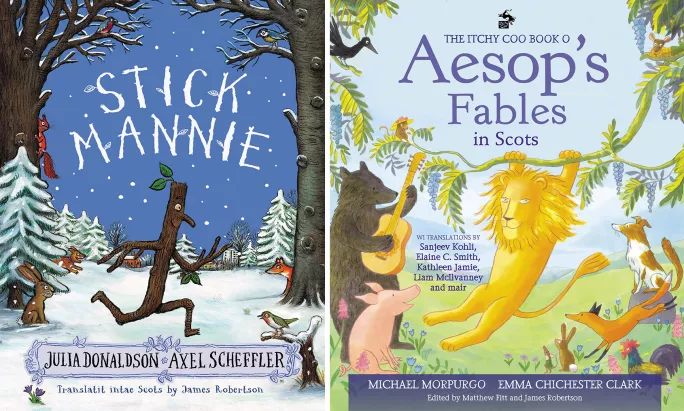On my first day as education officer for Itchy Coo, a P1 pupil told me in no uncertain terms that the name Itchy Coo was “wrong” and it should be called “Itchy Cow”. I thought to myself, this is a good start.
That was back in 2002, the first year of the Itchy Coo project. Itchy Coo is a publishing imprint of Black & White. It is led by myself and James Robertson. The imprint publishes original books in Scots and translations for young readers like King o the Midden, Katie’s Coo, Rabbie’s Rhymes, The Itchy Coo Book o Aesop’s Fables and, this autumn, Julia Donaldson’s Stick Mannie. James is the general editor and, for nine years, I was the project’s schools officer.
Now, in August 2022, as Itchy Coo turns 20, what do we know about the impact that books in Scots have on learning? The P1 who insisted “coo” was wrong showed the enduring honesty of young people towards language and reading. They tell it like it is.
Yet, with equal candour, many pupils from Scots-speaking backgrounds have said that reading books in Scots has made them feel more confident and enthusiastic about reading in general. Some even reported that they loved reading and writing Scots at school because it felt great being encouraged by teachers to use their own words and words they recognised from home in the classroom.
In the past, if a child spoke Scots, there was generally little to reflect or support their Scots language at school. Often pupils were punished for using it.
But in 2022, young people can learn about Scots in school through Scots language topics in primary and BGE (broad general education) and in Scottish studies or the Scots Language Award in the senior phase. And there are now plenty of exciting engaging books in Scots to read for all levels, from Itchy Coo and other publishers.
And what are the benefits of reading in Scots?
I think there are as many answers to that as there are readers. In my experience as a visiting author and teacher, I met pupils who simply enjoyed reading Scots books. Others were inspired by reading in Scots to start writing in Scots with some going on to become published writers. Some pupils said it helped them better understand the culture and history of Scotland, others said that it made them more tolerant towards people who speak differently from them.
Itchy Coo worked with lots of wonderful teachers over the years. Many spoke about the impact Scots had on their pupils’ confidence. A Falkirk teacher singing from Itchy Coo’s nursery rhyme book Katie’s Coo said a P2 pupil who participated very little in class ran and jumped into her teacher’s arms because she knew the Scots songs from home. A reluctant reader in S1 dumfoonert his teacher by volunteering to read in front of his class when offered a book in Scots.
The impact of Scots in education is also in evidence in the new Itchy Coo Book o Aesop’s Fables. Among its contributors with some superb Scots translations are a practising English teacher, a school librarian and a recent school leaver.
The Scots language may indeed be “wrong” for some but for a growing number of pupils and teachers in Scotland, it seems right - and democratic - to include more Scots in our young people’s learning.
Matthew Fitt is a writer and teacher. For more info on Itchy Coo at 20, visit www.itchy-coo.com






